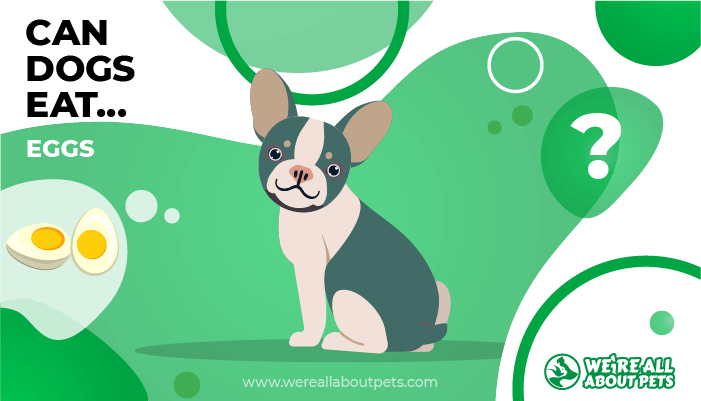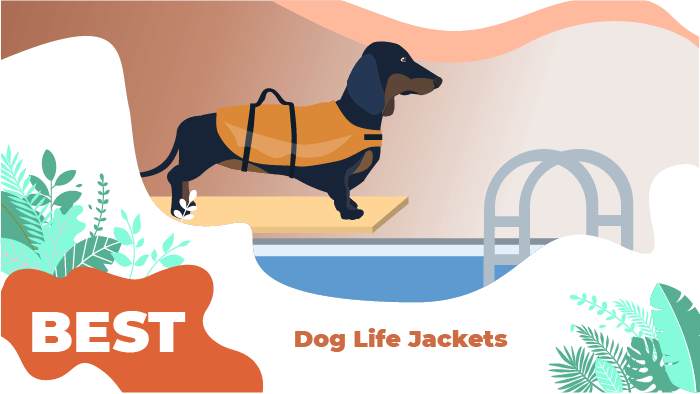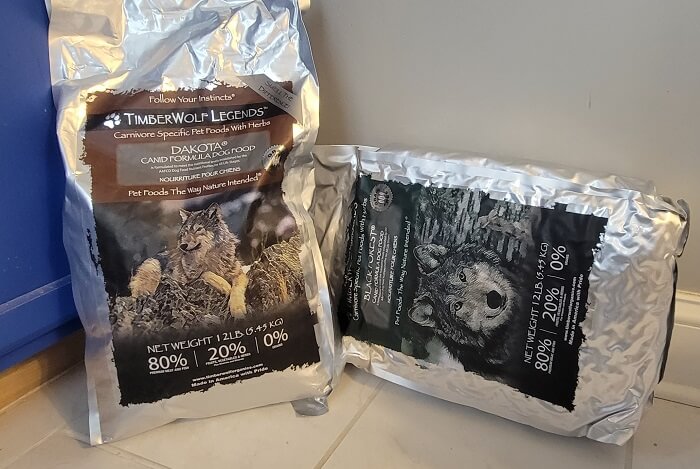Can Dogs Eat Eggs?
This page contains affiliate links. We may earn money or products from the companies mentioned in this post through our independently chosen links, which earn us a commission. Learn More

News comes and goes about eggs for humans. It seems one month they are good for us and the next they are bad. But what about dogs? Can dogs eat eggs? The answer is a definite yes! Eggs are a terrific source of protein for dogs.
Find out more about dogs and eggs in our short guide.
Eggs Nutrition Stats
A serving size of eggs for a human is considered to be one cup (4.86 large eggs or 243 grams).
- Calories: 347 (17% daily value)
- Protein: 30.6 g (61% daily value)
- Carbohydrates: 1.9 g (1% daily value)
- Fat: 24.2 g (37% daily value)
- Saturated Fat: 7.5 g (38% daily value)
- Vitamin A: 1183 iu (24% daily value)
- Vitamin D: 85.1 iu (21% daily value)
- Vitamin E: (Alpha Tocopherol): 2.4 mg (12% daily value)
- Vitamin K: 0.7 mcg (1% daily value)
- Manganese: 0.1 mg (5% daily value)
- Magnesium: 29.2 mg (7% daily value)
- Vitamin B6: 0.3 mg (17% daily value)
- Calcium: 129 mg (13% daily value)
- Copper: 0.2 mg (12% daily value)
- Thiamin: 0.2 mg (11% daily value)
- Folate: 114 mcg (29% daily value)
- Vitamin B12: 3.1 mcg (52% daily value)
- Potassium: 326 mg (9% daily value)
- Phosphorus: 464 mg (46% daily value)
- Sodium: 340 mg (14% daily value)
- Zinc: 2.7 mg (18% daily value)
- Niacin: 0.2 mg (1% daily value)
- Pantothenic acid: 3.5 mg (35% daily value)
- Riboflavin: 1.2 mg (68% daily value)
- Selenium: 77.0 mcg (110% daily value)
- Iron: 4.4 mg (25% daily value)
Eggs are very high in cholesterol . One serving contains 1028 mg which is equal to 343 percent of the recommended daily value for a human.
Eggs Nutritional Facts At A Glance
Eggs in this context refer to chicken eggs. Eggs from other birds, such as duck eggs, will have different nutritional values.
Eggs are loaded with vitamins and minerals, especially riboflavin, vitamin B12, and phosphorus. They are also a terrific source of protein and selenium.
On the down side, they are high in saturated fat and very high in cholesterol.
Overall, they are made up of about two percent carbohydrates, 63 percent fats, and 35 percent protein. They are considered to be one of the most nutritious of all foods. They are also highly bioavailable. This means that the body can easily access and use the nutrients in the food. Eggs are one of the most bioavailable forms of protein.
Eggs are also comparatively low in calories considering they contain so much protein and other nutrients. One eggs has just about 77 calories, 6 grams of protein, and 5 grams of fats. They have been called “The Incredible, Edible Egg,” and some nutritionists consider them to be the perfect food.
Eggs are high in cholesterol which sometimes makes headlines. But, according to some health sources, cholesterol in your food doesn’t necessarily mean your blood cholesterol will rise.
Eggs do raise cholesterol in some people, but not in everyone. People who have genetic disorders such as familial hypercholesterolemia or a gene variant called ApoE4 may need to limit or avoid eating eggs. Most people can safely eat eggs.
In fact, eating eggs can increase HDL – the “good” cholesterol.
Eggs also contain choline, an important nutrient that is lacking in the diet for some people. Choline helps build cell membranes and has a role in producing signaling molecules in the brain. It’s also important in digestion.
In some studies, eating eggs appeared to play a role in reducing the risk of heart disease by transforming LDL – the “bad” form of cholesterol.
Eggs also contain the important antioxidants lutein and zeaxanthin which can reduce the risk of cataracts and macular degeneration as people age.
Can Dogs Eat Eggs?
So, can dogs eat eggs? Absolutely, positively yes. Eggs provide an excellent source of protein for dogs. They are also packed with vitamins and minerals of all kinds that are good for your dog. Plus, most dogs love eggs any way you want to prepare them.
Are Eggs Good for Dogs?
Eggs are great for dogs. Along with being high in protein, eggs contain essential amino acids and fatty acids that help your dog’s body function. They are a good source of linoleic acid and Vitamin A which are good for your dog’s skin and coat, for example.
You don’t need to worry about cholesterol for your dog either. As mentioned earlier, cholesterol can be a red herring even where humans are concerned and eggs are safe for most people to eat. Cholesterol is not an issue for your dog either. Dogs don’t get the same cholesterol-related health issues that humans get. You don’t need to worry about only giving your dog egg whites.
If your dog is eating too much egg, you will notice it because he’s gaining weight from the extra clories and not because he’s developing any health problems.
Many good quality dog foods today include eggs as one of their protein sources because of their protein and other nutrients.
In some cases, some scrambled eggs or a softly boiled egg can be given to a dog that has an upset stomach to help the dog’s stomach settle.
How Many Eggs Can Dogs Eat?
Since eggs are high in calories and fats, you need to take this into consideration when you are planning to give your dog some eggs. Treats and snacks shouldn’t make up more than about 10 percent of your dog’s daily calories. One large egg has nearly 80 calories. If you have a 30-pound neutered dog that needs 800 calories per day, he shouldn’t have more than one egg in a day as a treat.
If you have a bigger dog he could have more eggs. A smaller dog should have less.
If you are giving your dog some scrambled eggs because he has an upset stomach or in place of a regular meal, deduct those calories from his daily calories.
How Often Can Dogs Eat Eggs?
If your dog enjoys eggs and they don’t cause him any digestive problems, he could eat a small quantity of cooked eggs every day. Do watch your dog’s weight. Since they are high in calories and fats, eggs can put weight on your dog.
The Correct Diet Is Important
Dogs need to eat the correct diet for good health. All dogs need good quality protein and fat appropriate for their age, lifestyle, and health condition in order to thrive. Most healthy dogs need the following things in their diet:
Good Sources of Protein
Meat, fish, poultry, and eggs are all good sources of animal protein. Animal protein is generally easier for dogs to digest. The more precisely the protein is identified on the label, the better.
Good Sources of Fat
Fat provides essential fatty acids (EFA) and helps distribute the fat soluble vitamins A, D, E, and K so they can be easily absorbed by your dog’s body.
Named Ingredients
Named ingredients are usually better than generic ingredients. The more specific, the better, so you know what your dog is eating.
Low to Moderate Carbohydrates
Most experts recommend diets that contain low to moderate amounts of carbohydrates. Carbohydrates are not “bad” for dogs but they should not be used as a substitute for protein. Many carbs do double duty as dietary fiber and probiotics.
Avoid Artificial Preservatives, Colors, and Sweeteners
Artificial preservatives and colors/dyes have been linked to some health problems in humans and animals. You should try to avoid these ingredients in dog foods.
AAFCO
AAFCO is the Association of American Feed Control Officials. AAFCO sets voluntary standards for pet food labeling. Look for foods that have these minimum standards.
Fresh Water
All dogs need access to fresh water unless they are ill or have some other reason to be temporarily kept away from water. For example, if you are house training your puppy, you can safely put away water overnight.
If your dog has health problems of any kind, please see a veterinarian for dietary advice. Ordinary diets may need to be adjusted.
What Are Other Healthy Alternatives to Eggs In A Dog’s Diet?
Eggs can be an option as an occasional treat for your dog but there are many other healthy foods you can give your dog in small amounts. You should consider these human foods as treats.
Check with your veterinarian if your dog has any health issues and you are concerned about giving any of these foods.
- Apples
- Asparagus
- Avocados
- Bananas
- Bell pepper
- Broccoli
- Brussels sprouts
- Carrots
- Cauliflower
- Cucumbers
- Green beans
- Mangos
- Oranges
- Parsnip
- Pears
- Pineapple
- Pumpkin
- Strawberries
- Summer squash
- Sweet potato
- Tomatoes
- Watermelon
- Zucchini
How Do You Give Your Dog Eggs?
Eggs are versatile and there are many different ways you can give them to your dog. It’s best to keep things simple so you don’t give your dog anything that might upset his digestion.
Don’t give your dog raw eggs unless you are following a raw food diet and have discussed the diet with a canine nutritionist. There are issues concerning Salmonella and other bacteria that you should know about.
Don’t give your dog eggshells to eat. Yes, the eggshells are a source of calcium but people who use the shells for calcium typically dry the shells and grind them into a fine powder. Then the powder is measured before it is added to a dog’s diet. Your dog doesn’t really gain any nutrition from eating an eggshell.
You can boil eggs, fry them, or cook them any way you would cook them for yourself. Many dogs like a plate of scrambled eggs. Plain eggs are best without seasoning or added ingredients.
Conclusion
Eggs may be the most complete food available. They are a great source of protein and other nutrients. You can cook them many different ways for your dog. It’s best not to give your dog raw eggs unless you have spoken with an expert about raw food diets.








